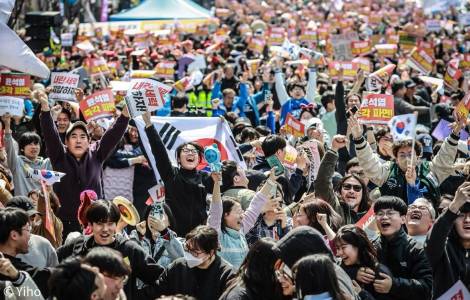
South Korea's Political Shift Post President Yoon's Impeachment
The recent impeachment of South Korea's President Yoon has sent shockwaves across the nation and beyond. As the dust begins to settle, questions about how this upheaval will reshape the country's political landscape are emerging. From the halls of power in Seoul to the local communities across the peninsula, all eyes are now on how South Korea will navigate through this critical juncture in its history.
A Nation at the Crossroads
South Korea stands at a significant crossroads following President Yoon's impeachment. With the political stability of the country hanging in the balance, political leaders and citizens alike are grappling with unprecedented challenges and opportunities. The implications of this pivotal moment extend beyond national borders, influencing regional and global dynamics. As the world watches, South Korea must chart a course that ensures democratic resilience and economic revival.
The impeachment has laid bare the deep-seated political divisions within the country. For many, it is not just a reflection of President Yoon's individual failings but also an indication of broader systemic issues. The government must now seek to restore public confidence and unite a fractured society in the face of economic challenges and foreign policy complexities.
The Role of the Catholic Church
The Catholic Church in South Korea has emerged as a significant player in the nation's political discourse. With a substantial following, the Church's influence cannot be underestimated during these turbulent times. The South Korean Bishops have called for a period of calm reflection and emphasized the importance of dialogue in resolving the country's political impasse.
The Bishops have been vocal about the need for politics to refocus on serving the people rather than individual gains. They urge political leaders to transcend partisan interests, prioritizing the country's well-being and democratic ideals. The Church's call for peace and unity resonates strongly with many South Koreans seeking a pathway out of this political crisis.
Reshaping Political Alliances
President Yoon's impeachment disrupts existing political alliances, creating an opportunity for new coalitions to form. As parties reposition themselves in response to the power vacuum, the potential for fresh alliances and policies emerges. In this fluid political environment, the electorate's role becomes increasingly significant as voters reconsider their affiliations and advocate for transparency and accountability.
South Korea's younger generation, in particular, is poised to play a pivotal role in shaping the nation's political future. Tech-savvy and globally aware, they bring a fresh perspective and demand a more inclusive and participatory political process. As political parties vie for their support, the youth's influence could steer South Korea toward progressive reforms and modern governance practices.
Economic Considerations in a Post-Impeachment Era
The economic implications of President Yoon's impeachment are equally profound. With investor confidence shaken, South Korea faces a critical challenge in restoring economic stability. The government must implement effective strategies that ensure growth and address pressing issues such as employment, inflation, and foreign investment. Economic revitalization will be key in restoring public faith in the political system.
Boosting investor confidence requires transparency and a commitment to reforms that foster a conducive business environment. As South Korea navigates through this post-impeachment era, it must balance domestic economic needs with its evolving role in the international arena. Strengthening regional trade and diplomatic ties can provide a much-needed impetus for growth and stability.
The Global Perspective
The international community is closely monitoring developments in South Korea, given its strategic geopolitical position in East Asia. The nation's political stability is crucial not only for its bilateral relations with neighboring countries but also for broader regional stability. As a key player in the global economy, South Korea's recovery will have wide-reaching implications.
Allies and trade partners are eager to see a return to stability, and there is cautious optimism about South Korea's ability to overcome the current challenges. The world recognizes South Korea's resilience and innovative spirit, attributes that can steer the nation toward a prosperous future. Engaging with global partners in constructive dialogue will be essential for navigating the post-impeachment landscape.
Forging a New Path Forward
The aftermath of President Yoon's impeachment holds significant lessons for South Korea's political establishment. It underscores the necessity for accountability, transparency, and a commitment to democratic principles. As the country seeks to redefine its governance structure, there is an opportunity to build a more inclusive and representative political system.
In galvanizing public support, leaders must engage with citizens across all demographics, listening to their concerns and aspirations. By fostering an environment of mutual respect and dialogue, South Korea can lay the groundwork for a more resilient and united society. The journey ahead may be fraught with challenges, but it also promises the potential for renewal and growth.
Conclusion
South Korea's political shift post-President Yoon's impeachment represents both a challenge and a chance for transformative change. As leaders and citizens navigate this critical period, the focus must remain on reinforcing democratic values, fostering economic recovery, and ensuring regional stability. The decisions made in this pivotal moment will shape South Korea's trajectory for generations to come, setting a precedent for resilience and renewal in the face of adversity.
In embracing this opportunity for change, South Korea can redefine its political landscape, ensuring a future that honors its rich history and looks forward toward a brighter, more unified tomorrow. The journey will require courage, patience, and a shared commitment to building a better nation for all its people.


